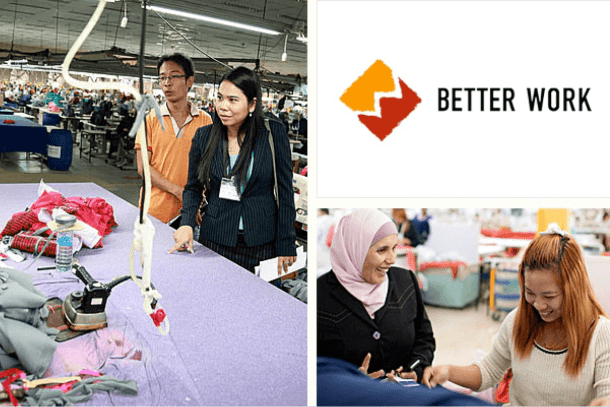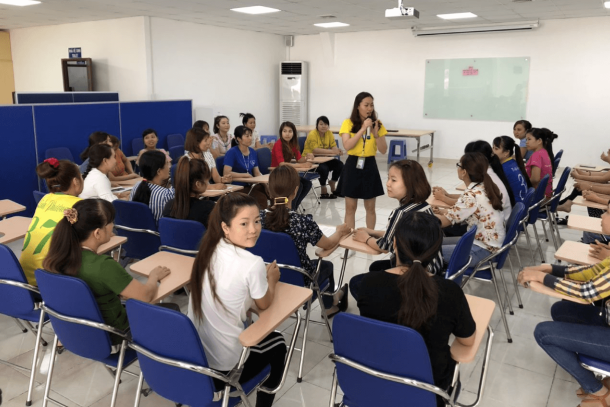
Women Empowerment
Abercrombie & Fitch Co. takes pride in supporting female factory workers and their communities. A&F Co.’s commitment to partnerships, community involvement, and worker safety and wellbeing is aligned with UN Sustainable Development Goals 3, 5, 8, and 17.
A&F Co. Strategy
To help educate and empower women in our supply chain, A&F Co. partners with key international organizations to provide onsite trainings on key issues such as gender equality, work life balance, non-discrimination and inclusion, violence and harassment in the world of work and more. Garment manufacturing is still a labor-intense industry, despite the advancements in technology and automation over the past decades. According to the International Labor Organization (ILO) the global garment supply chain is a “key entry point for women to enter the formal work force”. This has allowed women to strengthen skills, increase earning and improve overall quality of life.
Programs & Partnerships
Better Work Training
To help address risks for female workers of violence and/or harassment at work, A&F Co. has partnered with Better Work, a notable cross-country program by United Nation’s International Labour Organization (ILO) and the International Finance Corporation (IFC), to implement sexual harassment prevention training to workers in Cambodia, Bangladesh, Indonesia, Jordan and Vietnam.


Rise: Reimagining Industry to Support Equality
Since 2023, A&F Co. has partnered with RISE: Reimagining Industry to Support Equality, an initiative to support collaborative industry action at scale to advance gender equality in global garment, footwear and home textiles supply chains. RISE brings together the four largest women’s empowerment programs in the apparel industry—from BSR’s HERproject. Gap Inc. P.A.C.E, CARE International, and Better Work.
This partnership provides male and female factory workers in Cambodia, Vietnam and Indonesia with access to peer education programs improving communication, problem-solving and decision-making skills, time and stress management, and gender and worker rights. In each factory, “Peer Educators” are trained by local NGOs who then train the remaining factory staff in a Peer-to-Peer model. Key benefits of the programming include increased worker satisfaction and workplace performance, as well as improved communication between workers and management teams.
Personal Advancement & Career Enhancement (P.A.C.E.)/CARE
A&F Co. partnered with the Personal Advancement & Career Enhancement (P.A.C.E.) program from 2019 to 2022 to implement female training programs in Cambodian factories. P.A.C.E. was originally created by Gap Inc. in 2007 to support women working in the apparel industry. It has provided life skills, technical training and more to 500,000 working women and girls so far. In 2019, A&F Co. set a goal to train 50,000 workers in Bangladesh, Cambodia, India, Indonesia, Sri Lanka and Vietnam using modules focused on communication, problem solving, time and stress management, water sanitation and hygiene and financial literacy.
The modules program encourages women to express themselves in different situations by understanding the dynamics of communication at work, at home and in the community, as well as how gender may play a role in communication. These topics are intended to help women learn how to build problem solving and decision-making skills, as well as how to establish consensus with other people. In an effort to help women workers be happier and gain satisfaction at work. time and stress management instruction on multitasking and prioritization skills is also provided, as well as physical exercise and positive thinking trainings. To help prevent financial crises, financial literacy courses educate women on the importance of saving and financial planning.
Through this initiative, A&F Co. has also funded the CARE/P.A.C.E. Indonesia program to educate P.A.C.E. trainers to work with junior high girls. So far in 2019 to 2020, nearly 3,200 girls from over 27 schools have completed the Child Protection Training and Protection from Sexual Exploitation and Abuse (PSEA) Training, 74 teachers were trained and certified as P.A.C.E. facilitators and over 130 boys took part in class sessions. Additional programs were also provided, including a social media campaign to educate students on hand washing and other COVID-19 prevention techniques and an online gender sensitization session for male students on sex and gender and division of domestic labor during COVID-19.
